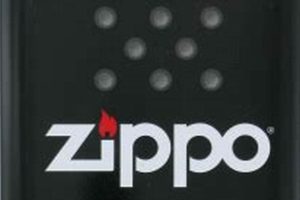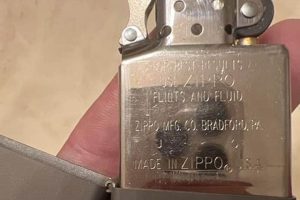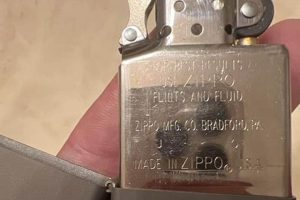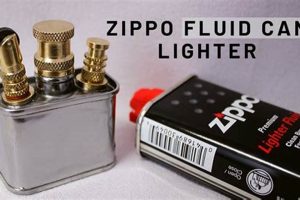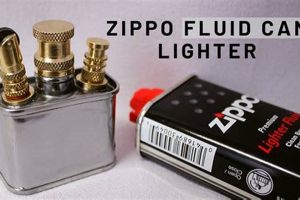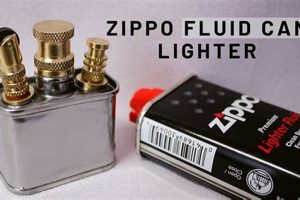Using charcoal lighter fluid in a Zippo-style lighter is strongly discouraged. These lighters are designed for a specific type of refined petroleum distillate, typically referred to as lighter fluid. Charcoal lighter fluid, on the other hand, often contains different chemical additives and has a much higher boiling point. This difference can lead to a variety of issues.
The use of an improper fuel can result in clogged wicks, unreliable ignition, excessive soot production, and a foul odor. Furthermore, the higher boiling point of charcoal lighter fluid can create pressure buildup inside the lighter casing, potentially leading to leakage or even dangerous bursts of flame. Sticking to the recommended fuel type ensures proper function and longevity of the lighter, and more importantly, promotes safety.
The following sections will delve further into the specific types of lighter fluids available, the potential hazards associated with using inappropriate fuels, and best practices for maintaining and refueling a Zippo-style lighter for optimal performance and safety.
Tips for Proper Lighter Fuel Usage
Maintaining a Zippo-style lighter’s optimal performance and ensuring safe operation requires using the correct fuel. The following tips offer guidance on proper fuel selection and handling.
Tip 1: Use Only Refined Lighter Fluid: Always utilize refined petroleum distillate specifically designed for lighters. This specialized fluid ensures proper wick saturation, clean burning, and minimizes residue buildup.
Tip 2: Avoid Charcoal Lighter Fluid: Never use charcoal lighter fluid in a lighter designed for refined petroleum distillate. The chemical composition and higher boiling point of charcoal lighter fluid can lead to malfunctions and safety hazards.
Tip 3: Refuel in a Well-Ventilated Area: Lighter fluid is highly flammable. Always refuel lighters in a well-ventilated area away from open flames and ignition sources.
Tip 4: Avoid Overfilling: Overfilling can result in leakage and fuel spillage. Fill the lighter until the wick is saturated, but avoid exceeding the recommended fill level.
Tip 5: Store Lighter Fluid Safely: Store lighter fluid in a cool, dry place away from children and heat sources. Always ensure the container is tightly sealed to prevent evaporation and accidental spills.
Tip 6: Dispose of Empty Containers Responsibly: Empty lighter fluid containers should be disposed of in accordance with local regulations for hazardous waste.
Tip 7: Clean the Lighter Regularly: Periodic cleaning can help prevent clogs and ensure consistent performance. Consult the manufacturer’s instructions for recommended cleaning procedures.
Adhering to these guidelines ensures proper lighter function, minimizes the risk of accidents, and extends the lifespan of the lighter.
By understanding the importance of using the correct fuel and following proper handling procedures, users can safely and effectively enjoy the utility of their lighters.
1. Fuel Type Compatibility
Fuel type compatibility is paramount when discussing the use of backyard grill lighter fluid in a Zippo-style lighter. The query “can I use backyard grill lighter fluid in my Zippo?” hinges directly on this critical factor. Using an incompatible fuel can have significant consequences for the lighter’s function and user safety. Understanding the nuances of fuel compatibility is essential for responsible lighter usage.
- Chemical Composition
Lighter fluids designed for Zippo-style lighters consist of refined petroleum distillates formulated for optimal burning characteristics. Charcoal lighter fluid, however, often contains additional chemicals and additives meant for igniting charcoal briquettes, not maintaining a consistent flame in a pocket lighter. These differing compositions lead to incompatibility.
- Boiling Point
The boiling point of a fuel influences its evaporation rate and flammability. Refined lighter fluids possess a lower boiling point, facilitating easy ignition and a steady flame. Charcoal lighter fluid’s higher boiling point can cause difficulties in ignition, erratic burning behavior, and potential pressure buildup within the lighter casing.
- Wick Compatibility
Zippo wicks are designed to absorb and transport refined lighter fluid efficiently. The differing viscosity and chemical properties of charcoal lighter fluid can clog the wick, hindering fuel flow and preventing proper lighter function. This can result in a lighter that fails to ignite or produces a weak, inconsistent flame.
- Safety Implications
Using incompatible fuels poses significant safety risks. Charcoal lighter fluid’s higher boiling point can lead to pressure buildup within the lighter, potentially causing leaks or dangerous bursts of flame. The added chemicals present in charcoal lighter fluid can also produce harmful fumes when burned in a lighter not designed for them.
In conclusion, fuel type compatibility is not a trivial concern. The use of backyard grill lighter fluid in a Zippo lighter represents a fundamental incompatibility that can lead to malfunctions, reduced lighter lifespan, and potentially dangerous situations. Adhering to the manufacturer’s recommended fuel type is crucial for safe and reliable operation.
2. Zippo Design Specifications
Zippo lighter design specifications are integral to understanding why using backyard grill lighter fluid is inadvisable. These specifications dictate the lighter’s proper function and safe operation, directly impacting fuel compatibility. Examining these design elements clarifies the potential risks associated with using inappropriate fuels.
- Wick Material and Construction
Zippo wicks are typically made of a woven, non-combustible material designed to draw specifically formulated lighter fluid up to the flint wheel for ignition. These wicks are calibrated for the viscosity and chemical properties of refined lighter fluid. The thicker consistency and differing chemical composition of backyard grill lighter fluid can saturate and clog the wick, impeding fuel flow and hindering proper ignition. This can lead to a malfunctioning lighter and potentially dangerous fuel buildup.
- Chimney Design and Airflow
The chimney surrounding the wick is precisely engineered to regulate airflow, ensuring a consistent flame and efficient combustion of the recommended lighter fluid. This airflow is optimized for the specific burning characteristics of refined lighter fluid. Using a denser fuel like backyard grill lighter fluid disrupts this carefully calibrated airflow, leading to incomplete combustion, excessive soot production, and a higher risk of flare-ups.
- Fuel Chamber and Sealing Mechanisms
The fuel chamber and sealing mechanisms within a Zippo lighter are designed to contain refined lighter fluid securely, minimizing evaporation and preventing leaks. These seals are typically made of materials compatible with refined lighter fluid. The chemical composition of backyard grill lighter fluid, however, can degrade these seals over time, compromising their integrity and increasing the risk of fuel leakage, which poses a significant fire hazard.
- Flint and Ignition System
The flint and ignition system are calibrated for the volatility and flammability of refined lighter fluid. Using backyard grill lighter fluid, with its different flash point and burning properties, can strain the ignition system, leading to misfires, inconsistent sparking, and potential damage to the flint wheel mechanism. This can render the lighter unreliable and potentially unsafe.
In summary, the interconnected design elements of a Zippo lighter underscore the importance of using the correct fuel. Employing backyard grill lighter fluid disrupts these carefully engineered systems, leading to compromised functionality, reduced lifespan, and potential safety hazards. Adhering to the manufacturer’s fuel recommendations ensures optimal performance and safe operation.
3. Charcoal Lighter Fluid Composition
Charcoal lighter fluid composition plays a crucial role in determining its suitability for use in a Zippo-style lighter. The question “can I use backyard grill lighter fluid in my Zippo?” necessitates a close examination of this composition. Understanding the inherent chemical properties and potential hazards associated with charcoal lighter fluid is essential for safe and responsible lighter usage.
- Volatile Organic Compounds (VOCs)
Charcoal lighter fluids typically contain a mixture of VOCs, including hydrocarbons like heptane, octane, and nonane. These compounds are highly flammable and contribute to the fluid’s ability to ignite charcoal quickly. While effective for this purpose, these VOCs can produce a strong odor and potentially harmful fumes when burned in a Zippo lighter, which is not designed for such fuels. The incomplete combustion of these VOCs within the confined space of a Zippo can also lead to soot buildup and malfunction.
- Additives and Accelerants
Many charcoal lighter fluids include additives and accelerants to promote faster and easier ignition of charcoal. These additives can vary widely in their chemical composition, but often include oxygenates or other chemicals that enhance combustion. These additives are not compatible with the materials used in Zippo lighters and can corrode internal components, damage the wick, and negatively impact the lighter’s long-term performance.
- Higher Boiling Point
Compared to refined lighter fluids specifically designed for Zippo lighters, charcoal lighter fluid generally has a higher boiling point. This difference significantly affects its evaporation rate and burning characteristics. The higher boiling point can result in difficulty igniting the fluid within the lighter, leading to inconsistent flames, sputtering, and potential pressure buildup within the lighter casing.
- Residue and Soot Formation
Due to the complex mixture of VOCs and additives in charcoal lighter fluid, its combustion in a Zippo lighter often produces a significant amount of residue and soot. This residue can clog the wick, obstruct airflow within the chimney, and foul the lighter’s internal mechanisms. Over time, this buildup can lead to malfunctions and significantly reduce the lifespan of the lighter.
In conclusion, the chemical composition of charcoal lighter fluid renders it unsuitable for use in a Zippo lighter. The combination of VOCs, additives, a higher boiling point, and the potential for residue buildup poses significant risks to the lighter’s functionality and user safety. Using the recommended refined lighter fluid is crucial for preserving the lighter’s performance and preventing potentially hazardous situations.
4. Risk of Malfunction
The question “can I use backyard grill lighter fluid in my Zippo?” is inextricably linked to the risk of malfunction. Using an improper fuel, such as backyard grill lighter fluid, significantly increases the likelihood of various malfunctions within a Zippo-style lighter. These malfunctions can range from minor inconveniences to potentially hazardous situations.
One primary malfunction arises from the incompatibility of backyard grill lighter fluid with the wick material. Zippo wicks are designed for the viscosity of refined lighter fluid. The thicker, often more viscous nature of backyard grill lighter fluid can lead to wick clogging. This clogging impedes fuel flow to the ignition point, resulting in difficulty lighting, a weak or sputtering flame, or complete failure to ignite. Furthermore, the chemical composition of some backyard grill lighter fluids can leave gummy residues on the wick, exacerbating the clogging issue.
Another potential malfunction relates to the fuel delivery system. The seals and other components within a Zippo lighter are designed for refined lighter fluid. Exposure to the different chemical composition of backyard grill lighter fluid can degrade these components over time. This can lead to fuel leaks, posing a fire hazard and rendering the lighter unusable. The higher boiling point of backyard grill lighter fluid can also create excessive pressure buildup inside the lighter casing, potentially leading to seal failure and fuel leakage.
Incomplete combustion represents another risk. Backyard grill lighter fluid often contains additives and other chemicals not present in refined lighter fluid. These additives, intended for igniting charcoal, do not burn cleanly in a Zippo lighter’s more confined environment. This can result in increased soot production, which can clog the chimney and further impede airflow, exacerbating malfunction. The incomplete combustion can also produce unpleasant odors and potentially harmful fumes.
In summary, using backyard grill lighter fluid in a Zippo lighter presents a significant risk of various malfunctions, compromising both performance and safety. Understanding this inherent risk reinforces the importance of using only the recommended fuel type to ensure proper function and mitigate potential hazards.
5. Potential Fire Hazard
The connection between using backyard grill lighter fluid in a Zippo-style lighter and the potential fire hazard is direct and significant. This inappropriate practice introduces several distinct risks that increase the likelihood of unintended fires. The higher flash point of charcoal lighter fluid, compared to refined lighter fluid, creates a volatile situation within the lighter’s confined fuel reservoir. Pressure buildup from the volatile vapors can lead to leaks, especially if seals are compromised by the fluid’s chemical composition. Leaked fluid, combined with the presence of an ignition source (the lighter’s flint and wick), drastically elevates the risk of accidental ignition. Furthermore, the unpredictable burning behavior of charcoal lighter fluid can cause bursts of flame or sputtering, projecting burning droplets onto nearby flammable materials.
Consider a scenario where a lighter fueled with backyard grill fluid leaks inside a pocket. The friction from movement or body heat could ignite the leaked fluid, causing burns and potentially igniting clothing. Another scenario involves refilling the lighter. The higher volatility of charcoal lighter fluid increases the risk of vapor ignition during the refilling process, especially if an open flame is nearby. Reports exist of individuals experiencing significant burns due to such incidents. While less common, the potential for a lighter fueled with an inappropriate fluid to explode during use cannot be disregarded. The pressure buildup within the casing, exacerbated by heat, can exceed the structural integrity of the lighter, resulting in a dangerous rupture and fire.
Understanding the potential fire hazards associated with using backyard grill lighter fluid in a Zippo lighter is paramount. Choosing the correct fuel is not merely a matter of performance; it is a critical safety precaution. Minimizing fire risks requires adhering to manufacturer recommendations, using only refined lighter fluid designed for these devices, and exercising caution during refilling and use. The potential consequences of ignoring these precautions underscore the serious nature of this fire hazard.
6. Recommended Fuel Usage
Recommended fuel usage sits at the heart of the “can I use backyard grill lighter fluid in my Zippo?” question. This seemingly simple query masks a critical safety and functionality concern. Manufacturers explicitly recommend using refined lighter fluid, specifically formulated for these devices. This recommendation is not arbitrary; it stems from careful consideration of the lighter’s design, material composition, and intended operation. Disregarding this advice by using backyard grill lighter fluid, despite its superficial similarity, introduces significant risks.
One key reason for this recommendation lies in the differing chemical compositions. Backyard grill lighter fluid often contains additives and higher boiling point solvents designed for igniting charcoal, not for maintaining a consistent flame in a pocket lighter. These substances can clog the wick, impair fuel flow, and produce excessive soot and residue. Moreover, they can react with the lighter’s internal components, leading to corrosion and premature failure. Real-world examples abound of users experiencing malfunctions, leaks, and even small explosions due to using inappropriate fuels, highlighting the practical significance of adhering to recommendations.
The potential consequences of ignoring recommended fuel usage extend beyond mere malfunction. Using the wrong fuel poses a genuine fire hazard. The higher volatility and different burning characteristics of backyard grill fluid can lead to unpredictable flames, fuel leaks, and dangerous pressure buildup within the lighter casing. This heightened risk underscores the vital importance of following manufacturer guidelines. Ultimately, understanding and adhering to recommended fuel usage is not just a matter of best practiceit’s a matter of safety and responsible ownership.
7. Lighter Maintenance
Lighter maintenance is inextricably linked to the question of whether backyard grill lighter fluid can be used in a Zippo-style lighter. Proper maintenance becomes significantly more complex and potentially less effective when an inappropriate fuel is used. The interaction between fuel type and maintenance procedures directly impacts the lighter’s longevity, reliability, and safe operation. Understanding this connection is crucial for responsible lighter ownership.
- Wick Replacement
Regular wick replacement is a standard maintenance task for any Zippo-style lighter. Using backyard grill lighter fluid significantly accelerates wick deterioration due to clogging from heavier residues and chemical incompatibility. This necessitates more frequent replacements and increases the difficulty of the procedure as the wick becomes gummed up and difficult to extract. Furthermore, improper fuel can leave a persistent residue within the lighter, affecting the performance of even a new wick.
- Flint Replacement and Adjustment
While flint replacement is a routine task, the use of backyard grill lighter fluid can complicate this process. Residue buildup from the improper fuel can foul the flint wheel mechanism, hindering its rotation and impacting spark generation. This can lead to difficulty igniting the lighter and may necessitate more frequent flint replacements or even cleaning of the flint mechanism itself. Furthermore, adjusting the flint spring becomes more challenging due to the accumulation of gummy residue.
- Cleaning the Lighter Casing
Cleaning the lighter casing is essential for maintaining both appearance and functionality. However, backyard grill lighter fluid leaves a sticky residue that is difficult to remove. This residue can attract dirt and debris, further complicating cleaning efforts. Over time, this buildup can affect the hinge mechanism and other moving parts, leading to stiffness and reduced functionality. The residue can also transfer to hands and clothing during use.
- Addressing Fuel Leaks and Clogs
Fuel leaks and clogs are significantly more likely to occur when using backyard grill lighter fluid. The incompatibility of the fluid with the lighter’s seals can lead to seal degradation and leakage. Additionally, the thicker consistency and residue from the improper fuel can clog the fuel delivery system, hindering fuel flow and requiring more extensive cleaning procedures to restore functionality. These issues increase maintenance complexity and potentially create hazardous situations.
In conclusion, lighter maintenance is directly affected by the type of fuel used. The use of backyard grill lighter fluid introduces complications and increases the difficulty of routine maintenance procedures, potentially leading to more frequent repairs, reduced lifespan, and increased safety risks. Adhering to the manufacturer’s recommendation of using refined lighter fluid simplifies maintenance, ensures proper function, and promotes safe operation.
Frequently Asked Questions
This section addresses common inquiries regarding the use of backyard grill lighter fluid in Zippo-style lighters, clarifying potential misconceptions and emphasizing safe practices.
Question 1: What is the primary risk of using backyard grill lighter fluid in a Zippo lighter?
The primary risk is malfunction and potential fire hazard. The differing chemical composition and higher boiling point of grill fluid can lead to clogging, inconsistent flames, fuel leaks, and pressure buildup, increasing the risk of unintended ignition.
Question 2: Why is Zippo-specific lighter fluid recommended?
Zippo-specific fluid is formulated to ensure optimal performance and safety. Its specific properties match the lighter’s design, minimizing malfunctions and reducing fire risks associated with incompatible fuels.
Question 3: Are all lighter fluids interchangeable?
No, lighter fluids are not universally interchangeable. Different lighter designs require specific fuel types. Using an incompatible fluid can lead to malfunctions, damage, and safety hazards.
Question 4: What can happen if the wrong fuel is used?
Using the wrong fuel can result in various issues, including clogged wicks, inconsistent flames, difficulty igniting, fuel leaks, unpleasant odors, and potentially dangerous pressure buildup within the lighter casing.
Question 5: Can using the wrong fuel void the lighter’s warranty?
Using fuels not explicitly recommended by the manufacturer can void warranties. It’s essential to adhere to manufacturer guidelines to maintain warranty coverage.
Question 6: Where can one find the recommended fuel type for a specific lighter?
The recommended fuel type is typically specified in the lighter’s user manual or on the manufacturer’s website. Adhering to these recommendations ensures optimal performance and safety.
Using the correct fuel for a Zippo-style lighter is paramount for safe and reliable operation. Disregarding manufacturer recommendations can lead to malfunctions, potential fire hazards, and void warranties.
The following section provides additional resources for safe lighter handling and maintenance.
Conclusion
Exploration of the query “can I use backyard grill lighter fluid in my Zippo?” reveals a critical need for understanding fuel compatibility and safe lighter practices. Using charcoal lighter fluid in a Zippo-style lighter presents significant risks, including malfunctions, reduced lighter lifespan, and potential fire hazards. These risks stem from the inherent incompatibility between the chemical composition of charcoal lighter fluid and the design specifications of Zippo lighters. Key takeaways include the importance of using refined lighter fluid as recommended by the manufacturer, understanding the potential consequences of using inappropriate fuels, and adhering to safe handling and maintenance procedures.
Safe and responsible lighter usage necessitates informed decision-making. Prioritizing safety and optimal functionality requires adherence to manufacturer guidelines and a clear understanding of the potential risks associated with using incompatible fuels. Continued education on proper lighter maintenance and fuel selection contributes to a safer environment for all.


